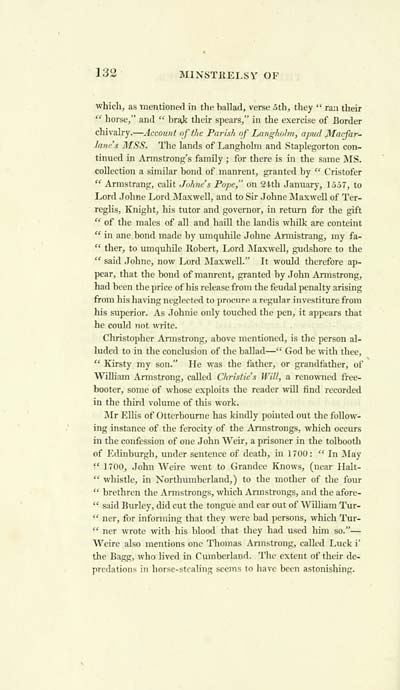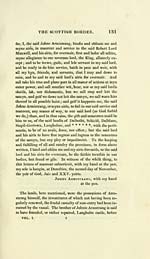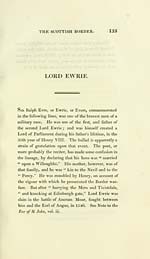Download files
Complete book:
Individual page:
Thumbnail gallery: Grid view | List view

132 MINSTKELSV OF
which, as mentioned in the ballad, verse 5th, they " ran their
" horse," and " braJc their spears," in the exercise of Border
chivalry. — Account of the Parish of Langholm, apud Marfar-
lane's MSS. The lands of Langholm and Staplegorton con-
tinued in Armstrong's family ; for there is in the same i\IS.
collection a similar bond of manrent, granted by " Cristofer
" Armstrang, caUt Johne's Pope," on 24th January, loo7, to
Lord Johne Lord JVIaxwell, and to Sir Johne JNlaxwell of Ter-
reglis. Knight, his tutor and governor, in return for the gift
" of the males of all and haill the landis whLlk are conteint
" in ane bond made by umquhile Johne Armistrang, my fa-
" ther, to umquhile Robert, Lord iMaxwell, gudshore to the
" said Johne, now Lord iMaxwell." It would therefore ap-
pear, that the bond of manrent, granted by John Armstrong,
had been the price of his release from the feudal penalty arising
from his having neglected to procure a regular investiture from
his superior. As Johnie only touched the pen, it appears that
he could not wTite.
Christo])her Armstrong, above mentioned, is the person al-
luded to in the conclusion of the ballad — " God be with thee,
" Kirsty my son." He was the father, or grandfather, of
WiUiam Armstrong, called Christie's Will, a renowned free-
booter, some of whose exploits the reader will find recorded
in the third volume of this work.
jMr Ellis of Otterbourne has kindly pointed out the follow-
ing instance of the ferocity of the Armstrongs, which occurs
in the confession of one John Weir, a prisoner in the tolbooth
of Edinburgh, under sentence of death, in 1 700 : " In IVIay
" 1700, John Weire went to Grandee Knows, (near Halt-
" whistle, in Northumberland,) to the mother of the four
" brethren the Armstrongs, which Armstrongs, and the afore-
" said Burley, did cut the tongue and ear out of William Tur-
" ner, for informing that they were bad persons, which Tur-
" ner wrote with his blood that they had used him so." —
Weire also mentions one Thomas Armstrong, called Luck i'
the Bagg, who lived in Cumberland. The extent of their de-
predations in horse-stealing seems to have been astonishing.
which, as mentioned in the ballad, verse 5th, they " ran their
" horse," and " braJc their spears," in the exercise of Border
chivalry. — Account of the Parish of Langholm, apud Marfar-
lane's MSS. The lands of Langholm and Staplegorton con-
tinued in Armstrong's family ; for there is in the same i\IS.
collection a similar bond of manrent, granted by " Cristofer
" Armstrang, caUt Johne's Pope," on 24th January, loo7, to
Lord Johne Lord JVIaxwell, and to Sir Johne JNlaxwell of Ter-
reglis. Knight, his tutor and governor, in return for the gift
" of the males of all and haill the landis whLlk are conteint
" in ane bond made by umquhile Johne Armistrang, my fa-
" ther, to umquhile Robert, Lord iMaxwell, gudshore to the
" said Johne, now Lord iMaxwell." It would therefore ap-
pear, that the bond of manrent, granted by John Armstrong,
had been the price of his release from the feudal penalty arising
from his having neglected to procure a regular investiture from
his superior. As Johnie only touched the pen, it appears that
he could not wTite.
Christo])her Armstrong, above mentioned, is the person al-
luded to in the conclusion of the ballad — " God be with thee,
" Kirsty my son." He was the father, or grandfather, of
WiUiam Armstrong, called Christie's Will, a renowned free-
booter, some of whose exploits the reader will find recorded
in the third volume of this work.
jMr Ellis of Otterbourne has kindly pointed out the follow-
ing instance of the ferocity of the Armstrongs, which occurs
in the confession of one John Weir, a prisoner in the tolbooth
of Edinburgh, under sentence of death, in 1 700 : " In IVIay
" 1700, John Weire went to Grandee Knows, (near Halt-
" whistle, in Northumberland,) to the mother of the four
" brethren the Armstrongs, which Armstrongs, and the afore-
" said Burley, did cut the tongue and ear out of William Tur-
" ner, for informing that they were bad persons, which Tur-
" ner wrote with his blood that they had used him so." —
Weire also mentions one Thomas Armstrong, called Luck i'
the Bagg, who lived in Cumberland. The extent of their de-
predations in horse-stealing seems to have been astonishing.
Set display mode to: Large image | Transcription
Images and transcriptions on this page, including medium image downloads, may be used under the Creative Commons Attribution 4.0 International Licence unless otherwise stated. ![]()
| Early Gaelic Book Collections > J. F. Campbell Collection > Minstrelsy of the Scottish border > Volume 1 > (334) |
|---|
| Permanent URL | https://digital.nls.uk/80612334 |
|---|
| Description | Vol. I . |
|---|---|
| Shelfmark | Cam.2.d.17 |
| Additional NLS resources: | |
| Attribution and copyright: |
|
| Description | Volumes from a collection of 610 books rich in Highland folklore, Ossianic literature and other Celtic subjects. Many of the books annotated by John Francis Campbell of Islay, who assembled the collection. |
|---|
| Description | Selected items from five 'Special and Named Printed Collections'. Includes books in Gaelic and other Celtic languages, works about the Gaels, their languages, literature, culture and history. |
|---|

